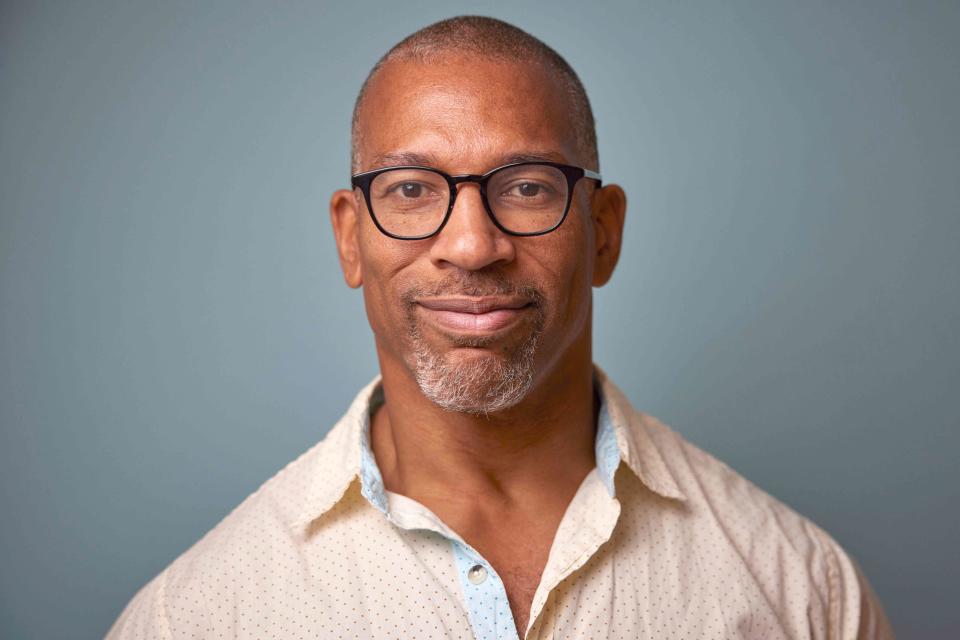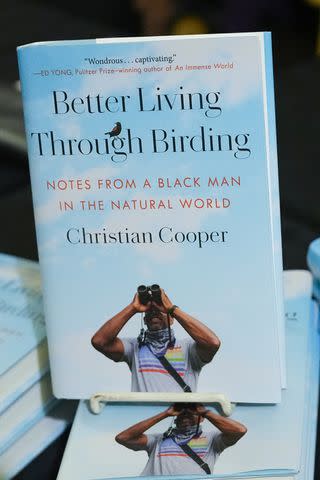Christian Cooper's Tips for First-Time Birders: 'The Main Thing Is to Enjoy Yourself' (Exclusive)
The Emmy winner and bestselling author gave PEOPLE a masterclass on birdwatching, from the best time for sightings to all the tools you might need to make a spot

Matt Licari/Invision/AP
Christian Cooper poses for a portrait to promote the book "Better Living Through Birding: Notes from a Black Man in the Natural World" on Wednesday, June 14, 2023, in New YorkCelebrated birdwatcher and author Christian Cooper wants birding to be welcoming to everyone
According to the expert, binoculars are not a necessity to enjoy birdwatching
Cooper also shares other tips to help animal lovers enthusiastically begin their birdwatching journey
Anyone can be a birder, according to the Emmy-winning host of Extraordinary Birder, Christian Cooper.
"The main thing is to enjoy yourself and appreciate the birds. You'll learn a lot, and people will keep teaching you," Cooper tells PEOPLE while spotting red-tailed hawks in New York City's Tompkins Square Park. "It's a wonderful window into our natural world and a great way to relax and chill and feel a little better about life in general."
The talented birdwatcher has dedicated his life to making the pastime more accessible. He has done this by bringing birding to N.Y.C. public school students and using the attention he received following his 2020 encounter with a White woman in Central Park — who called the police on him while he was birding and falsely accused him of threatening her — to share birding with more people.
While news of the incident became widespread enough to warrant its own Wikipedia page, Cooper doesn't fixate on the moment. Instead, he focuses on the same thing he always has: marveling at birds and bringing the curious and the intimidated into the birdwatching fold.
"[Birding] just creates this web of awareness of the world you didn't have before," Cooper says. "It's about getting more and more information that makes you understand where you are, who you are, and where you fit in."

Leon Bennett/Getty
Christian Cooper attends 51st Annual Daytime Emmy Creative Arts & Lifestyle awards at The Westin Bonaventure Hotel & Suites, Los Angeles on June 08, 2024 in Los Angeles, CaliforniaThe Better Living Through Birding author started birdwatching in his backyard as a child with a gifted pair of binoculars.
For first-time bird watchers, he recommends "bringing your whole self to the activity," heading to a local park, being as present as possible, and paying attention to your footfalls and all of your senses.
A field guide and birding apps can help identify bird body patterns, songs, and where each species likes to spend its time, but those skills also come with time. Most importantly, Cooper reminds first-time bird watchers that "the welfare of the bird is always number one."
"You know what people always say to me? 'Oh, I'm not really a birder.' And I'm like, 'Well, do you look at birds and enjoy it?' " Cooper asks with a laugh. "'Yeah? Well, then you're a birder.' You don't have to know all the scientific names. You don't have to be able to identify everything in a snap. The main thing is that you have fun, and, in the process, you will learn tremendous amounts of things."

Presley Ann/Getty
Christian Cooper attends The Out100 Party 2023 at NeueHouse Hollywood on November 09, 2023 in Hollywood, CaliforniaMaking birding more accessible has massive implications for Cooper. The birding expert says people from all backgrounds need to be invested in birds to save them. A 2019 study in Science found that North America had lost roughly 29% of its bird population since 1970.
"If we don't have all people of all kinds involved in birding; if it remains perceived as a White people-only activity, then we're not gonna have a constituency for the protection of the birds going forward," Cooper says. "If you care about the birds, you have to care about diversity because otherwise they'll be gone."
Ready to start birding? Here are Christian Cooper's tips for first-time birdwatchers:
Be aware of your surroundings
Cooper says the best way to increase your bird sightings is to be sensitive to your surroundings: listen for running water, look for undergrowth, and respect the habitat. Where there is undergrowth and audible water, you're more likely to see birds because that's where they drink, look for food, and interact with each other.
"In fact, when I was a kid in my backyard, I dug a trench and hung a garden hose over it to create a little mini Mississippi so that the sound and the little stream would pull in migrant birds," he says. "I would sit there for hours at my window looking down at the birds coming into the little muddy stream."
Although the author wouldn't necessarily recommend flooding your backyard, it did teach him the power of the right habitat. Cooper also notes that birders should minimize using too much noise, like bird songs from their phones, to attract birds.
"You're disrupting their natural behavior," he says of using playback sounds. "And the whole thing about birding is you want to see the birds in the wild on their terms."
Other birdwatching etiquette to follow: Don't go on private property without permission and avoid pointing binoculars at houses.

John Nacion/Getty
Christian Cooper's book at a Whoopi Goldberg in conversation with Christian Cooper at 92nd Street Y on July 12, 2023 in New York CityLook for birds in the morning and afternoon
The best-selling author says finding birds is far easier in the early morning and afternoon for a simple (and relatable) reason.
"The main thing is the same thing that drives us, which is they're hungry. They wake up in the morning and they're like, damn, I want to eat something," Cooper says with a laugh. "So when they're active, that's when you're gonna have a better chance of finding them."
Try out birding tools
Although binoculars or a camera with a long lens can be helpful birdwatching tools, they aren't required. If you need binoculars, Cooper recommends asking for them as a gift or borrowing them from a local birdwatching group or library.
Cooper also recommends using tools like the apps Merlin and eBird when you're out looking for birds. The former, which he calls "Shazam for birds," can identify birds from their songs, and the latter acts as a log for all your findings, compiling data for what Cooper calls "community science" as well.
These tools can be helpful, but Cooper warns, "You don't want to use them as a total crutch because you want to learn on your own as well."
Learn your "field marks"
Once you've found birds, sort them by "field marks" — recognizable features like body plan, color, and tail appearance. These traits can help you identify birds faster.
Cooper recommends the Sibley and Peterson Field Guides for helping with identification. The pocket-sized book can be carried on birdwatching adventures.
Connect with your local birding community
Starting a new hobby can be intimidating, but Cooper says finding your local birding community is a great way to get going. Other birdwatchers can help you find biodiverse places to look for the animals and encourage you in moments of frustration.
Try birdwatching solo and with a group
"You can go completely solo and enjoy the solitude and the meditation, the communing with nature, or you can go with other people, and you can have the camaraderie and still get some of those other things," Cooper says. "I think the best way to learn is to do a little bit of both. When you bird with other birders, you will pick up lots of information and knowledge from that. But when you bird by yourself, you will also learn things in a way that will stick really, really well."

John Nacion/Getty
Christian Cooper attends a Whoopi Goldberg in conversation with Christian Cooper at 92nd Street Y on July 12, 2023 in New York City.Document your sightings
Keep a record of your findings. Noting the birds you've spotted will improve your ability to recognize the same birds again, Cooper advises. Bird logs can include photos, sketches, and notes.
"I did this for years: I would carry just a little pocket notepad and write down my sightings. So it was like a snapshot of the day in words," the author says.
Get the whole family involved
Birding may have the stereotype of being slow and quiet, but that doesn't mean kids can't enjoy the activity. Cooper, who has worked with schoolkids for over 30 years, says that engaging kids is similar to teaching an adult, but "kids are a little bit more receptive, and their attention span is going to be shorter."
Cooper recommends using mnemonics for learning bird songs and names, a tool that has helped him with N.Y.C. students and his young family members.
For more People news, make sure to sign up for our newsletter!
Read the original article on People.


